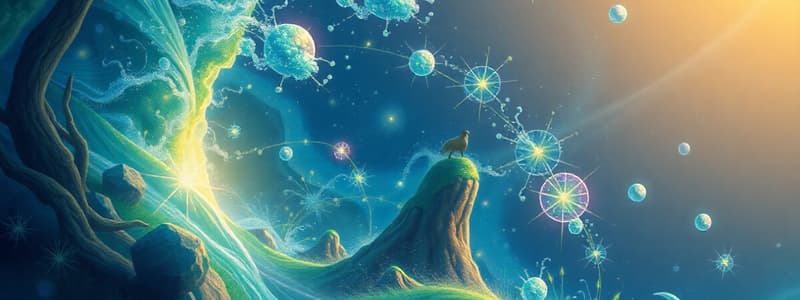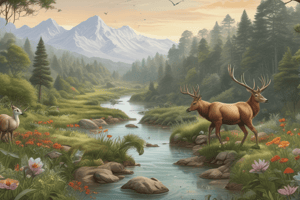Podcast
Questions and Answers
What is the primary focus of the study of evolution in biology?
What is the primary focus of the study of evolution in biology?
- The interaction between organisms and their environment
- The development of individual organisms
- The genetic code of living organisms
- The changes in populations over time (correct)
Which branch of biology focuses specifically on microorganisms?
Which branch of biology focuses specifically on microorganisms?
- Botany
- Microbiology (correct)
- Ecology
- Zoology
Which of the following best defines homeostasis?
Which of the following best defines homeostasis?
- The ability to adapt to new environments
- The process of growth and development in organisms
- Maintaining stable internal conditions despite external changes (correct)
- The reproduction of new organisms
What is the basic unit of life according to cell theory?
What is the basic unit of life according to cell theory?
Which life process refers to how organisms develop and change over time?
Which life process refers to how organisms develop and change over time?
In the scientific method, what follows after the formulation of a hypothesis?
In the scientific method, what follows after the formulation of a hypothesis?
What is one of the current trends in biology that focuses on studying genomes?
What is one of the current trends in biology that focuses on studying genomes?
Which role is primarily involved in conducting studies and experiments in laboratories?
Which role is primarily involved in conducting studies and experiments in laboratories?
Flashcards are hidden until you start studying
Study Notes
Definitions
- Biology: The scientific study of life and living organisms, encompassing various fields such as genetics, ecology, evolution, and physiology.
- Biodiversity: The variety of life in the world, including the variety of species, ecosystems, and genetic diversity.
Branches of Biology
- Botany: Study of plants.
- Zoology: Study of animals.
- Microbiology: Study of microorganisms.
- Genetics: Study of heredity and variation in organisms.
- Ecology: Study of interactions between organisms and their environment.
- Evolutionary Biology: Study of the origins and changes in the diversity of life over time.
Key Concepts
- Cell Theory: All living organisms are composed of cells; the cell is the basic unit of life.
- Homeostasis: The ability of an organism to maintain stable internal conditions despite external changes.
- Metabolism: Total chemical processes that occur within an organism to maintain life.
- Evolution: Change in the heritable characteristics of biological populations over successive generations.
Life Processes
- Growth and Development: Organisms grow and develop according to specific instructions coded for by their genes.
- Reproduction: Biological process by which new individual organisms are produced, either sexually or asexually.
- Response to Stimuli: Organisms respond to environmental changes (e.g., light, temperature).
Scientific Method
- Observation: Gathering information through senses.
- Hypothesis: Formulating a testable prediction.
- Experimentation: Conducting experiments to test the hypothesis.
- Analysis: Interpreting the data collected.
- Conclusion: Drawing conclusions based on the analysis.
Importance of Biology
- Helps understand the complexities of living organisms and their interactions.
- Essential for advancements in medicine, conservation, agriculture, and biotechnology.
- Fosters appreciation for the diversity of life and ecosystems.
Current Trends in Biology
- Genomics: Study of genomes and their functions.
- Synthetic Biology: Engineering new biological parts, devices, and systems.
- CRISPR Technology: Gene editing tool that allows for targeted modification of DNA.
Career Opportunities
- Research Scientist: Conduct studies and experiments in laboratories.
- Healthcare Professional: Roles in medicine, nursing, and health services.
- Environmental Consultant: Focus on conservation and sustainable practices.
- Biotechnologist: Develop products using biological systems.
Biology: The Study of Life
- Definition: The scientific study of life and living organisms, encompassing diverse fields like genetics, ecology, evolution, and physiology.
- Focus: Understanding the complexities of living organisms, their interactions, and the processes that govern life.
Branches of Biology
- Botany: The study of plants.
- Zoology: The study of animals.
- Microbiology: The study of microorganisms, including bacteria, viruses, and fungi.
- Genetics: The study of heredity and the variation of traits among living organisms.
- Ecology: The study of how organisms interact with each other and their environment.
- Evolutionary Biology: The study of the origins and changes in the diversity of life throughout history.
Key Concepts in Biology
- Cell Theory: A fundamental principle stating that all living organisms are composed of cells, and that the cell is the basic unit of life. This means that all biological processes and functions occur within cells.
- Homeostasis: The ability of an organism to maintain a stable internal environment, despite changes in the external environment. This is crucial for survival and proper functioning.
- Metabolism: The sum of all chemical reactions that occur within an organism to sustain life. These reactions break down nutrients to release energy and build necessary complex molecules.
- Evolution: The gradual change in the heritable characteristics of biological populations over successive generations. This is driven by natural selection and leads to the diversity of life we see today.
Essential Life Processes
- Growth and Development: Organisms increase in size and complexity throughout their life cycle. These processes are guided by genetic instructions.
- Reproduction: The process of creating new individuals, either sexually (involving two parents) or asexually (from a single parent).
- Response to Stimuli: Organisms react to changes in their environment, such as changes in light, temperature, or chemical cues. This allows them to adapt and survive.
The Scientific Method in Biology
- Observation: Carefully gathering information about the natural world through senses and instruments.
- Hypothesis: Developing a testable explanation for an observation or phenomenon. This is a proposed answer that can be tested through experimentation.
- Experimentation: Conducting controlled experiments to test the hypothesis and gather data.
- Analysis: Examining and interpreting the data collected during the experiment.
- Conclusion: Drawing conclusions based on the analysis, supporting or refuting the hypothesis.
Importance of Biology
- Understanding Life: Provides insights into the structure, function, and interactions of living organisms, contributing to our understanding of the natural world.
- Advancements in Medicine: Leads to the development of new treatments, cures, and preventative measures for diseases.
- Conservation and Environmental Protection: Informs strategies to protect biodiversity and ecosystems, ensuring sustainable use of resources.
- Agricultural Innovation: Improves crop yields and disease resistance, contributing to food security.
- Biotechnology: Develops new products and technologies from biological systems, impacting industries like medicine, agriculture, and energy.
Current Trends in Biology
- Genomics: The study of genomes, the complete set of genes in an organism. This field is revolutionizing our understanding of genetics and evolution.
- Synthetic Biology: Engineering new biological parts, devices, and systems. This has the potential to develop novel solutions in medicine, energy, and manufacturing.
- CRISPR Technology: A powerful gene editing tool that allows scientists to precisely modify DNA sequences. This has immense potential in treating genetic diseases and developing new therapies.
Career Opportunities in Biology
- Research Scientist: Conducted studies and experiments in academic, government, or industrial settings.
- Healthcare Professional: Roles in medicine, nursing, dentistry, and other health services.
- Environmental Consultant: Working to protect ecosystems and promote sustainable practices.
- Biotechnologist: Developing and using biological systems for applications in medicine, agriculture, and industry.
Studying That Suits You
Use AI to generate personalized quizzes and flashcards to suit your learning preferences.




